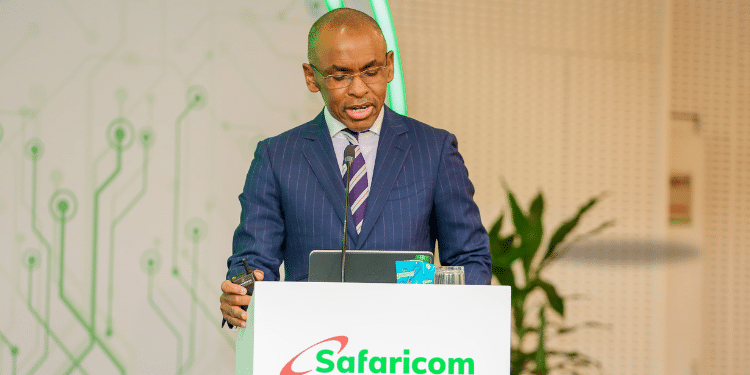Safaricom PLC has reported a profit of Ksh69.8 billion for the financial year ending 31st March 2025.
According to the audited financial statements, the company’s total revenue increased to Ksh388.7 billion from Ksh349.4 billion in 2024.
This growth was driven by strong performance in core services, including revenue from contracts with customers, which reached Ksh384.4 billion, along with other sources contributing Ksh4.2 billion.
The company’s earnings before interest, tax, depreciation, and amortisation (EBITDA) stood at Ksh172.2 billion, up from Ksh163.3 billion in 2024.
However, depreciation and amortisation costs slightly affected operating profit, which amounted to Ksh104.9 billion, which is still higher than the Ksh80.4 billion recorded the previous year.
Earnings per share increased marginally, from Ksh1.6 in 2024 to Ksh1.7.
Despite profitability, the company reported a comprehensive loss of Ksh108 billion.
Safaricom attributed the loss to a significant foreign exchange loss resulting from translating operations in foreign markets, particularly due to a Ksh153.7 billion exchange difference loss on foreign operations.
The company’s equity holders received Ksh69.8 billion, while non-controlling interests registered a loss of Ksh24 billion.
The total comprehensive loss attributable to equity holders was Ksh98.3 billion, compared to a profit of Ksh35.4 billion in 2024.
Also Read: Safaricom Ethiopia Hits 10 Million Milestone in Four Years
Safaricom CEO Statement
In the results published on June 4, Safaricom CEO Peter Ndegwa stated that the financial year 2025 marked the successful culmination of the Vision 2025 strategy and established a strong foundation for the company’s ambitious Vision 2030 journey.
He added that the company delivered strong results, aligning closely with its guidance for both Kenya and Ethiopia, despite a challenging macroeconomic and regulatory environment.
Ndegwa noted that Safaricom maintained its market leadership amidst intense competition and an evolving regulatory landscape.
He highlighted that the performance was mainly driven by Safaricom’s robust expansion of M-PESA, increased mobile data adoption, and an effective device penetration strategy.
Ndegwa also highlighted Safaricom’s significant progress in 4G and 5G adoption, the launch of innovative ultra-fast home internet plans, and the introduction of tailored SME solutions.
Also Read: Safaricom Becomes East Africa’s First $7 Billion Company
Partnering for Progress
Furthermore, Ndegwa said that Safaricom strengthened its position as the leading digitisation and financial services partner of choice.
The company provided vital support to key public sector initiatives, such as Inua Jamii for senior citizens, and led the development of Kenya’s Integrated Health Information System.
“Our impactful ‘Grow with Safaricom Business’ programme empowered over 5,000 SMEs, and our new strategic business presence in Eastleigh deepened our engagement with local enterprises,” he stated.
Future Plans
Ndegwa explained that Safaricom’s strategic priorities include boosting profitability in Ethiopia and expanding its innovative digital solutions.
The company also aims to reinforce its organisational culture, increase its core market share, and deliver seamless, superior digital experiences.
“Over the next five years, we aim to significantly expand our leadership role in Africa’s digitisation agenda by building scalable, inclusive technology platforms across various sectors. We remain firmly committed to customer obsession and societal relevance,” he concluded.
Safaricom will hold the annual general meeting via electronic communication on July 25, 2025.
Follow our WhatsApp Channel and X Account for real-time news updates.








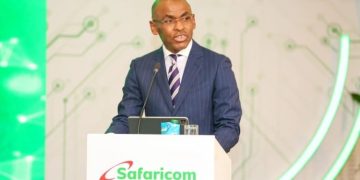








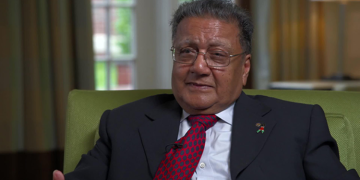
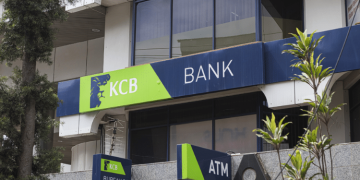

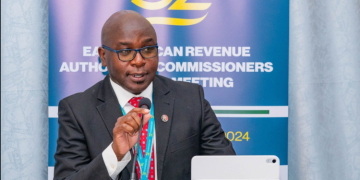

























![Odemba Names Provisional Harambee Starlets Squad For 2026 Wafcon Qualifiers [Full Squad] Odemba Names Harambee Starlets Squad For 2026 Wafcon Qualifiers](https://thekenyatimescdn-ese7d3e7ghdnbfa9.z01.azurefd.net/prodimages/uploads/2025/10/odemba-2025-360x180.png)
























